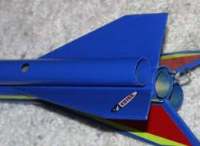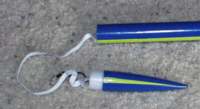| Diameter: | 0.98 inches |
| Manufacturer: | Estes  |
| Skill Level: | 2 |
| Style: | Sport |
 I had often looked at this kit and wondered how those twin parachutes would work. I found out one day when a friend launched his and had only one chute deployed. The recovery was a little hard on the rocket and broke one of the pods off the side of the rocket. Reading the other reviews, I have learned that this is the rule and not the exception for this rocket. I determined that my rocket would not suffer that same fate, but what to do?
I had often looked at this kit and wondered how those twin parachutes would work. I found out one day when a friend launched his and had only one chute deployed. The recovery was a little hard on the rocket and broke one of the pods off the side of the rocket. Reading the other reviews, I have learned that this is the rule and not the exception for this rocket. I determined that my rocket would not suffer that same fate, but what to do?
 Eventually I decided to build this kit as a standard pop-the-nose-off style recovery rocket. This requires little modification to the kit. First the vent tubes are not used, throw them into your spare parts box. Second find a suitable tube coupler and put it inside the main body tube where the vent holes are to cover them. The side pods then are attached to the rocket to cover these holes so filling them is not an issue. The vent holes in the side pods can be glued against the body tube or facing away from the body tube. I decided to place them away from the main body tube to see if they would cause a whistle as the rocket flew, and in the remote possibility if I wanted to continue the modification to parallel stage or cluster the rocket. If I were to do that I would come up with a more secure way to attach the side pods to the main body tube, I think that requires a more secure mounting method than a strip of glue between the tubes, but I digress...
Eventually I decided to build this kit as a standard pop-the-nose-off style recovery rocket. This requires little modification to the kit. First the vent tubes are not used, throw them into your spare parts box. Second find a suitable tube coupler and put it inside the main body tube where the vent holes are to cover them. The side pods then are attached to the rocket to cover these holes so filling them is not an issue. The vent holes in the side pods can be glued against the body tube or facing away from the body tube. I decided to place them away from the main body tube to see if they would cause a whistle as the rocket flew, and in the remote possibility if I wanted to continue the modification to parallel stage or cluster the rocket. If I were to do that I would come up with a more secure way to attach the side pods to the main body tube, I think that requires a more secure mounting method than a strip of glue between the tubes, but I digress...
 The nose cone of the kit is then attached in the normal way, do not glue it at this point as the instructions say or you will have a "lawn dart" instead of a rocket. Use one of the shock cord mounts and the provided shock cord in the normal fashion. Swap out the two 12" parachutes for a single larger one, 15" or 18" with a spill hole.
The nose cone of the kit is then attached in the normal way, do not glue it at this point as the instructions say or you will have a "lawn dart" instead of a rocket. Use one of the shock cord mounts and the provided shock cord in the normal fashion. Swap out the two 12" parachutes for a single larger one, 15" or 18" with a spill hole.
The first flight was using a B6-4 Estes motor with an 18" parachute with a very large spill hole. The launch was good and straight, once the motor burned out you could hear a whistle that faded as the rocket slowed down and coasted to apogee. Just after apogee the ejection charge blew the nose cone off and in the process severed the shock cord. The booster section fell harmlessly to the soft grass of the field and the nose cone floated down on a tangled parachute. After recovering the pieces it was noted that the parachute was burned and the shock cord was scorched. Obviously there wasn't enough wadding in the rocket. Also a smaller parachute would be easier to pack into the body tube.
The second flight was also on a B6-4. The shock cord was tied back together and a 12" parachute was used. This time the parachute did not get caught and the recovery was perfect.
As much as I liked the rear ejection of the parachutes on this model, the troubles that I have seen with this method caused me to change this model to a more conventional recovery technique. With this modification done, there is only the normal recovery problems that we are well prepared for. This model lends itself to many possible modifications and improvements, not to mention that this kit is a scratch-builder's delight with it's assortment of body tubes and nose cones.
Other Reviews
- Estes Gemini DC By George Pluck (July 8, 2013)
The Estes Gemini DC features twin 'chute deployment from the rear of two attached side pods. Though much maligned, it's a very cool kit Components Three tubes, one main and two for the side pods Balsa fins mount through the main tube Plastic nose cones My kit came with an extra engine clip as well as the usual Estes components. ...
- Estes Gemini DC By Tai Fu
Dual rear deployment parachute. The construction is good, because it has TTW fins, which means it is stronger than the other ones, also you don't have to worry about the fin alignment because the slot has done that for you. You just need to make sure that air can flow freely to the 2 parachute pods otherwise this rocket will lawn dart!!! You can always forget about the parachute pod and ...
- Estes Gemini DC By Alex Rothchild
Brief: The Estes Gemini DC is dual parachute, lawn dart ready single stage rocket with two side pods housing the chutes. It uses a 1/8 inch launch lug and has a single 18mm motor mount. The Gemini DC has four swept back balsa fins. Construction: The components used in this rocket are top quality. The parts list is: 1 BT-50 main body tube, slotted with vent holes 1 ...
 |
 |
Flights
 |
 |